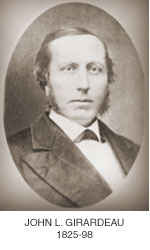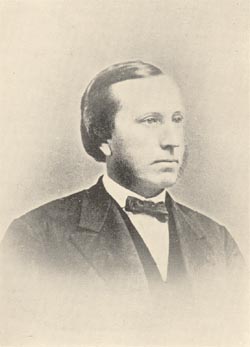Bibliography:
Articles-
The Southern Presbyterian Review-
Ministerial Consecration and Ministerial Support, 23.2
(April 1872) 161-188.
Our Ecclesiastical Relations to Freedmen, 18.1 (July 1867) 1-17.
The Book of Church Order, 29.1 (January 1878) 125-140. [published anonymously,
but identified as being by Girardeau by William Childs Robinson in Columbia
Theological Seminary and the Southern Presbyterian Church, p. 92.
Our thanks to Dr. C.N. Willborn for this information]
The Diaconate, 30.1 (January 1879) 1-32 and 31.1 (January 1880) 117-160
and 32.2 (April 1881) 191-209.
The Diaconate Again, 32.4 (October 1881) 628-664 and 33.1 (January 1882)
175-208.
The Freedom of the Will in its Theological Relations, 29.4 (October 1878)
611-655; 30.1 (January 1879) 51-84; 31.1 (January 1880) 1-45; 31.2 (April
1880) 323-350; 31.4 (October 1880) 613-648 and 32.1 (January 1881) 63-102.
The Importance of the Office of Deacon, 32.1 (January 1881) 1-29.
The Philanthropic Argument for Foreign Missions, 29.3 (July 1878) 547-574.
The Suffering Seaboard of South Carolina, 27.2 (April 1876) 199-227.
The Support of Superannuated Ministers, and the Indigent Families of Deceased
Ministers, 11.4 (January 1859) 592-608.
Theology as a Science, Involving an Infinite Element [inaugural address],
27.3 (July 1876) 462-485.
Criticisms and Reviews, in The Southern Presbyterian Review--
"Critical Notices," rev. of "The Emotions. By
James McCosh." Southern Presbyterian Review 31, no. 2 (April 1880): 354-59.
The Presbyterian Quarterly-
Berkeley's Idealism, 1.1 (July 1887) 1 - 31.
Natural Religion and the Gospel, 7.3 (July 1893) 331-352.
The Christo-Centric Principle of Theology, 6.1 (January 1892) 1-20.
The Contra-Natural Character of the Miracle, 2.2 (July 1888) 177-207.
The Relation of Miracle to the Evidences of a Divine Revelation, 2.3 (October
1888) 369-387.
Criticisms and Reviews, in The Presbyterian Quarterly--
4 Alexander's Problems
in Philosophy, The Presbyterian Quarterly, 1.1 (July 1887) 186-189.
Review of Some Problems of Philosophy, by Archibald Alexander,
Professor of Philosophy in Columbia College. (New York: Charles Scribner's
Sons, 1886).
4 Dr. Fairbairn's
"Morality," The Presbyterian Quarterly, 1.3 (January 1888) 559-561. Review
of Of the Doctrine of Morality in its Relation to the Grace of Redemption,
by Robert B. Fairbairn, D.D., LL.D., Warden of St. Stephen's College,
Annandale, N.Y. (New York: Thomas Whittaker, 1887) Dr. Morris vs. Future
Probation, The Presbyterian Quarterly, 1.3 (January 1888) 545-551.
4 Dr. Morris
vs. Future Probation, The Presbyterian Quarterly, 1.3 (January
1888) 545-551. Review of Is There Salvation After Death? A Treatise
on the Gospel in the Intermediate State, by E.D. Morris, D.D., LL.D.,
Lane Theological Seminary. Second edition. A.C. Armstrong & Son, 714
Broadway, New York: Crown 8vo., pp. 252. 1857.
4 Dr. Watt's
Reign of Causality, The Presbyterian Quarterly, 2.1 (April 1888)
145-148. Review of The Reign of Causality by Robert Watts, D.D.,
Professor of Systematic Theology in the General Assembly's College, Belfast.
(New York: Scribner & Welford, 743-745 Broadway), 414pp., larger 12mo.
4 Harris's
Self-Revelation of God, The Presbyterian Quarterly, 1.1 (July 1887)
174-177. Review of The Self-Revelation of God, by Samuel Harris,
D.D., LL.D., Professor of Systematic Theology in Yale University, (New
York: Charles Scribner's Sons, 1887).
4 McCosh's
Realistic Philosophy, The Presbyterian Quarterly, 1.1 (July 1887)
179-186. Review of Realistic Philosophy, Defended in a Philosophic
Series, by James McCosh, D.D., LL.D., Litt. D., (etc.), President
of Princeton College. In two volumes; I. Expository; II. Historical and
Critical. (New York: Charles Scribner's Sons, 1887).
4 Peabody's
Moral Philosophy, The Presbyterian Quarterly, 1.1 (July 1887) 177-179.
Review of Moral Philosophy: A Series of Lectures by Andrew P. Moody,
D.D., LL.D., Emeritus Professor of Christian Morals in Harvard University,
(Boston: Lee and Shepherd, Publishers, No. 10 Milk street, 1 vol. 12 mo.
Pp. 337. 1887.)
4 Plumtre's
"Spirits in Prison," The Presbyterian Quarterly, 1.2 (October 1887)
368-371. Review of The Spirits in Prison, and Other Studies on the
Life After Death, by E.H. Plumtre, D.D., Dean of Wells. (New York:
Thomas Whittaker, 1887)
4 Dr. Lindsay
Alexander's Theology, The Presbyterian Quarterly, 2.3 (October
1888) 484-487. Review of A System of Biblical Theology, by the
late W. Lindsay Alexander, D.D., LL.D., Principal of the Theological Hall
of the Congregational Churches in Scotland, Minister of Augustine Church,
Edinburgh, etc., etc. In two volumes. New York: Scribner & Welford,
743-745 Broadway. 8vo. pp. 973.
4 Ewald's Theology, The Presbyterian Quarterly, 2.3 (October 1888)
484-487. Review of Old and New Testament Theology, by Heinrich
Ewald, late Professor in the University of Göttingen, Author of the
"History of Israel," "Prophets of the Old Testament,"
etc. Translated from the German, by the Rev. Thomas Goadby, B.A., President
of the Baptist College, Nottingham. New York: Scribner & Welford,
743-745 Broadway. 8vo. pp. 458.
4 Lichtenberger's
History of German Theology." The Presbyterian Quarterly 9 (July 1889):
446-452. Review of History of German Theology in the Nineteenth Century.
By F. Lictenberger, Dean of the Faculty of Protestant Theology at Paris.
Translated and edited by W. Hastie, B.D., Examiner in Theology, University
of Edinburgh. New York: Scribner & Welford. 1889. 8vo. pp. 624.
4 Strong's
Systematic Theology, The Presbyterian Quarterly, (January 1890)
122-124. Review of Systematic Theology. A Compendium and Commonplace
Book, Designed for the use of Theological Students. By Augustus Hopkins
Strong, D.D., President and Professor of Biblical Theology in the Rochester
Theological Seminary. Second Edition, Revised and Enlarged. New York:
A.C. Armstrong & Son, 714 Broadway. 1889. Large 8vo., pp. 760.
4 Van Dyke's
Lectures On The Church, The Presbyterian Quarterly, 15 (January
1891) 133-139. Review of The Church: Her Ministry and Sacraments. Lectures
Delivered on the L.P. Stone Foundation at Princeton Theological Seminary,
in 1890. By Henry J. Van Dyke, D.D., Pastor of the Second Presbyterian
Church of Brooklyn. 8vo., pp. 265. New York: Anson D.F. Randolph &
Co., 38 West Twenty-third Street. 1890.
4 Mead's
"Supernatural Revelation," The Presbyterian Quarterly,
4.2 (April 1890) 302-308. Review of Supernatural Revelation: An Essay
concerning the Basis of the Christian Faith. By C.M. Mead, Ph.D.,
D.D., lately Professor in Andover Theological Seminary. New York: Anson
D.F. Randolph & Co. 1889. Large 8vo., Pp. 469.
Books and separately published items, organized
chronologically --
1857
4 Obituary
of Mrs. Eliza Leland, consort of Rev. A.W. Leland, D.D., professor of
theology in the Seminary at Columbia, S.C., and epitaphs from the burial
place, (Charleston : Walker, Evans, 1857), 12pp.; 22 cm.
1858
4An
address on behalf of the Society for the Relief of Superannuated Ministers
and the Indigent Families of Deceased Ministers of the Synod of South
Carolina, (Columbia, S.C. : R.W. Gibbes, 1858), 19pp.; 21 cm. [SBT]
1860
4 A catechism
for the oral instructions of coloured persons who are inquirers concerning
religion, or candidates for admission into the church, (Charleston
[S.C.] Printed by Evans & Cogswell, 1860), 88pp. 15 cm. [NDD]
4 Conscience
and Civil Government: An Oration Delivered Before The Society of Alumni
of the College of Charleston on Commencement Day, March 27th, 1860, (Charleston, SC: Evans & Cogswell, 1860), 20pp.; 24 cm. Special Collections
Library, College of Charleston. [also, SBT]
1871
4 Confederate
Memorial Day at Charleston, S.C.: Reinterment of the Carolina Dead from
Gettysburg. (Charleston: William G. Mazyck, Printer, 1871).
1872
Christ's pastoral presence with his dying people: a sermon delivered
January 7th, 1872, in Zion Church, Glebe Street, Charleston, S.C. (Charleston,
S.C. : Walker, Evans, & Cogswell, 1872), 16 p. ; 24 cm. [SBM]
1874
4 The
remembrance of the righteous: A memorial sermon, occasioned by the death
of the Rev. David H. Porter, D.D., and preached in the First Presbyterian
Church, Savannah, Ga., Feb. 8th, 1874, (Columbia, S.C.: Printed at
the Presbyterian Pub. House, 1874), 27pp.; 22 cm.
1876
4 Theology
as a science, involving an infinite element: Inaugural address, delivered
before the General Assembly at Savannah, Ga., May 23d, 1876 (Columbia,
S.C.: Presbyterian Publishing House, 1876), 34pp.; 22 cm.; Originally
published in the Southern Presbyterian Review, 27.3 (July 1876)
462-485.
1884
4"Eulogy
on Professor George Howe, D.D., LL.D.," in Memorial Volume of
the Semi-Centennial of the Theological Seminary at Columbia, South Carolina, (Columbia, SC: Presbyterian Publishing House, 1884), pages 387-418.
4 "The
Federal Theology: Its Import and Its Relative Influence," in Memorial
Volume of the Semi-Centennial of the Theological Seminary at Columbia,
South Carolina, (Columbia, SC: Presbyterian Publishing House, 1884),
pages 96-128.
4 Rev.
David H. Porter, D.D. [biographical sketch], in Memorial Volume of
the Semi-Centennial of the Theological Seminary at Columbia, South Carolina,
(Columbia, SC: Printed at the Presbyterian Publishing House, 1884), pp.
347-348. [HC]
4 Rev. Robert
R. Small [biographical sketch], in Memorial Volume of the Semi-Centennial
of the Theological Seminary at Columbia, South Carolina, (Columbia,
SC: Printed at the Presbyterian Publishing House, 1884), pp. 360-361. [HC]
1885
4 "Historical
Address." in Historical Addresses and Commemorative Ode, Delivered
in the Synod of South Carolina in Purity Church, Chester, October 24,
1885. (Richmond: Whittet & Shepperson, Printers, 1885).
The substance of two speeches on the teaching of evolution in Columbia
Theological Seminary, delivered in the Synod of South Carolina at Greenville,
S.C., Oct., 1884, (Columbia, S.C., William Sloane, 1885), 35pp.; 22
cm.
1888
4 Instrumental
Music in Public Worship. (Richmond: Whittet & Shepperson, Printers,
1888).
1889
4 Individual
liberty and church authority: A sermon preached at Westminster Church,
Charleston, Thursday night, April 11, 1889, during the sessions of Charleston
Presbytery, (Columbia, S.C. : William Sloane, 1889), 18pp.; 21 cm.
1890
4 Calvinism and Evangelicalism. (Richmond:
The Presbyterian Committee of Publications, 1890).
1891
4 The Will In Its Theological Relations. (Columbia, SC: W. J. Duffie
and New York: The Baker and Taylor Co., 1891).
1900
4 Discussions
of Philosophical Questions. Edited by George A. Blackburn. Richmond:
The Presbyterian Committee of Publications, 1900.
1905
4 Discussions
of Theological Questions. Edited by George A. Blackburn. (Richmond:
The Presbyterian Committee of Publications, 1905).
1907
4 Sermons.
Edited by George A. Blackburn. (Columbia, SC: The State Company, 1907).
Undated--
4 R. L. Dabney,
R. K. Smoot, J. L. Girardeau, C. R. Vaughn, C. F. Collier, W. L.T. Prince,
James D. Armstrong. An Open Letter To The Members Of The Southern Presbyterian
Church. (New Orleans: E. S. Upton, n.d.)
Edited Works [i.e., with Girardeau serving as Editor
or Co-editor]--
The collected writings of James Henley Thornwell, D.D., LL. D., late
professor of theology in the Theological Seminary at Columbia, South Carolina,
John B. Adger and John L. Girardeau, editors, (Richmond: Presbyterian
Committee of Publication, 1871-1873), 4 volumes; 23 cm.
©PCA
Historical Center, 12330 Conway Road, St. Louis, MO, 2004. All Rights
Reserved. |


